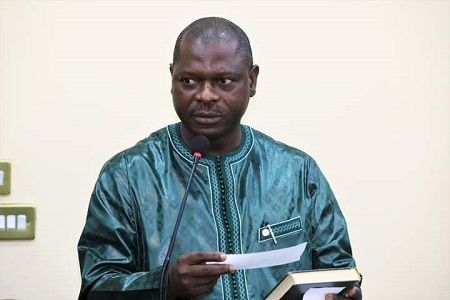By: Modou Touray
The Minister of Finance and Economic Affairs, Mr Seedy Keita has said that the Russia-Ukraine war adversely affected the country’s growth prospects resulting in rising global commodity prices, falling remittances, a fall in international tax revenues and an increase in financing pressures.
Keita explained that the Government revised the 2022 approved budget in July to reflect the shocks in the macroeconomic conditions during the year.
“The new direction of government development policy will support recovery in light of the adverse impact of the Russia -Ukraine war and the lingering effects of the COVID-19 pandemic. The 2023 Budget is prepared with minimal new revenue measures in order to give respite to the private sector following the outbreak of the Coronavirus pandemic and the devastating impact of the Russia-Ukraine war that affected businesses across the country.
“More emphasis will be placed on improving compliance in tax administration to ensure that what is lawfully due to government is collected and on time,” the finance minister stressed.
He added that due to the hike of food and energy prices coupled with other risk factors such as currency depreciation, an adjustment in transport fares and pump prices, headline inflation reached 13.3% in September 2022 up from 11.7% in June 2022 and 8.2 per cent a year ago.
“The inflation pressure will continue to increase in the near term. This is a result of global inflationary pressures. The medium-term, inflationary pressure will ease and return to its long-run trend by next year in response to the tight monetary policy stance of the Central Bank of The Gambia and easing of global supply chains,” he revealed.
Seedy Keita, Minister of Finance and Economic Affairs, made the statement on Monday while presenting the 2023 Estimates of Revenues, Recurrent and Development Expenditures for The Gambia, saying the Gambia in 2022 registered low revenue compared to what they were anticipating.
He tabled the 2023 national budget estimate for consideration and approval by the National Assembly. The 1997 Constitution and the 2014 Public Finance Act make it mandatory for the finance minister to table the budget estimates before the National Assembly. Section 152 (1A) of the Constitution makes provision for the National Assembly to consider and approve the Estimates of Revenues and Expenditures within 14 days.
“On agriculture, it is projected to continue on the growth path reaching 6.6 per cent in 2023 – primarily supported by crop production and fishing and aquaculture. The growth prospects for the industry sector are estimated to increase to 6.9 per cent in 2023 up from 6 per cent in 2022 – mainly supported by electricity and mining and quarrying activities. On the service sector, he said the recovery in tourism, transport and storage, finance and insurance will enhance growth, with the sector growth projected to reach 4 per cent in 2023 from 2.4 per cent in 2022,” he highlighted.




